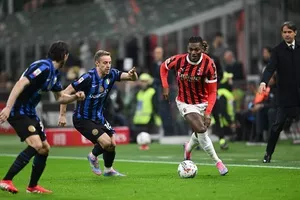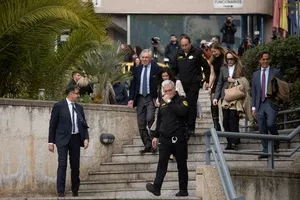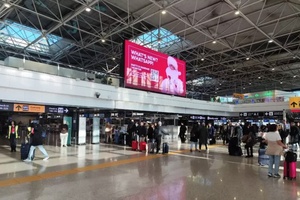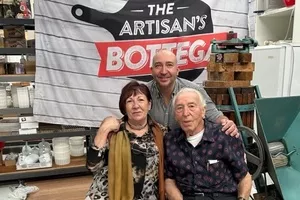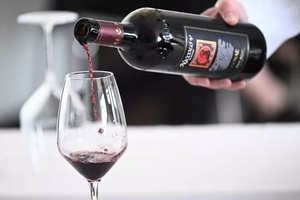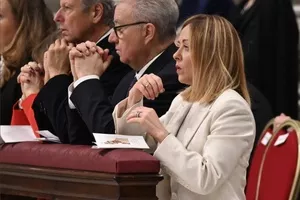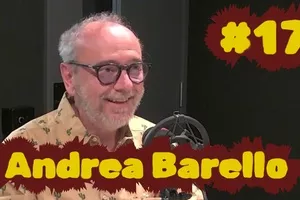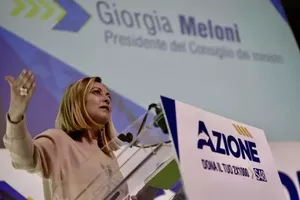MILAN - Emilia Bertolini was 11 years old when she first auditioned at the Victorian Opera, where she landed the part of Alice in Through the Looking Glass, an opera directed by Alan John and inspired by Lewis Carroll’s famous novel, Alice’s Adventures in Wonderland.
By that age, Bertolini, who has a Tuscan father and Irish mother, had already begun studying music by learning to play the flute, violin and piano. She was also singing in the Young Voices of Melbourne and Gondwana Voices choirs, experiences that were crucial to her training.
“I was very lucky because my parents were always very supportive, taking me to all my lessons, rehearsals and never missing a concert,” stressed Bertolini.
The singer recalls with pleasure her first observations of a professional environment, where she “noticed how the adults involved were constantly laughing and joking with each other”.
“[The comradery] is one of my favourite things about my job,” she revealed.
After graduating with a master’s degree in music and an undergraduate degree in Languages - French and Italian - from The University of Melbourne, Bertolini joined the Melba Opera Trust for two years after winning two scholarships.
It was a period of great dedication and study for the young woman who explains that one of the most important qualities needed to become a classical singer is patience, as “it usually takes many years”.
“It certainly helps to study vocal techniques [and have] a solid knowledge of Italian, French and German - and a penchant for the dramatic,” she adds.
Bertolini believes the starting point for pursuing this career can be very different depending on the person and their circumstances.
“I’ve met colleagues who grew up in the countryside or on farms, who had to go to boarding school at age six to even get close to music. Others never studied it until adulthood.
“So, I don’t think there is an obligatory path to follow to become an opera singer. Everyone has a personal story.”
However one achieves this goal, a great deal of preparation is a must. Preparation goes beyond mere singing, as one must learn the lyrics (often not in one’s native language) and, crucially, how to pronounce the words properly.
“So, if it’s an opera,” Bertolini explained, “you have to study not only your own part, but also that of all the other characters with whom you interact.
“You need to do the work of an actor, deciding on things like beats, emphasis, intention, and moments when you can conserve your energy.”
Among her favourite composers, the soprano lists Handel, Couperin, Vivaldi and Purcell, emphasising that her passion for Baroque music can be traced to the fact that it gives her plenty of space for personal interpretation.
“The same piece can vary significantly depending on the instruments, personal interpretation of the text or the physical space in which one is performing,” added Bertolini.
“Baroque music offers a wonderful level of freedom and individuality. This ability to express yourself uniquely within the music is one of the aspects I love most about it.”
Among the many challenges in this unique career, Bertolini’s biggest struggle comes from dealing with rejection, because “it’s often difficult not to take it personally.”
“As a singer, you really feel like you are sharing something so personal and unique to your humanity when you sing, and having people say, “no thank you” after you’ve poured your heart, not to mention time and energy, [into it, it] can be particularly disheartening.”
“[But] often those ‘noes’ bring you closer to the ‘yeses’ in your career, even if they hurt.”
At the end of last year, UNESCO formally announced the inclusion of Italian opera singing in the list of intangible cultural heritages of humanity. It was news that Bertolini welcomed enthusiastically, not only because Italian opera singing has influenced many other musical genres and is an integral part of the history of the Bel Paese, but also because it’s an art form that has been able to transform itself over centuries to continue sharing tales of the human experience.
“This acknowledgment from UNESCO, for me, not only honours the timeless beauty of opera but also validates the efforts of countless artists who pour their hearts into preserving and developing this loved art form,” she pointed out.
Raised in Melbourne, Bertolini now lives between Milan and London, where last year she completed a master’s degree at the Royal Academy of Music before winning the prestigious Concours Corneille in France.

















